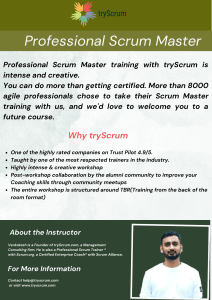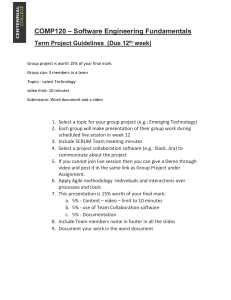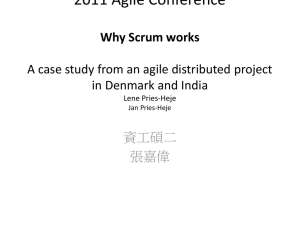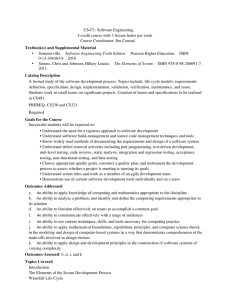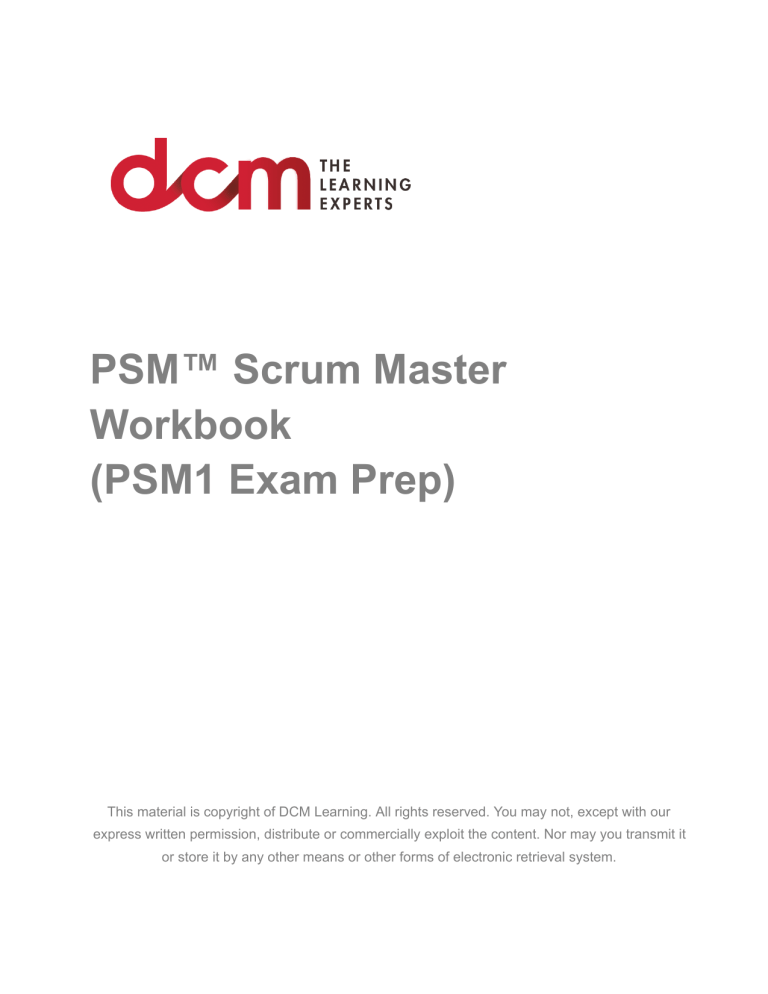
PSM™ Scrum Master Workbook (PSM1 Exam Prep) This material is copyright of DCM Learning. All rights reserved. You may not, except with our express written permission, distribute or commercially exploit the content. Nor may you transmit it or store it by any other means or other forms of electronic retrieval system. Scrum Course Workbook _______________________________________________________________________________________ TABLE OF CONTENTS How to use this Workbook 4 Scrum.org Professional Scrum Master Level 1 Exam 5 Assessment Details Module One: An Introduction to Scrum 6 7 Watch Video entitled: Why Move to Agile? 7 Watch Video Entitled: Iterative Delivery 8 Watch Video Entitled: Agile Manifesto 10 Watch the Teaching Toolbox: Definition of Done 12 Watch Teaching Toolbox: Artifacts 13 Watch Teaching Toolbox: Scrum Values 14 Watch Teaching Toolbox: Empiricism 15 Module Two: Scrum Roles 16 Watch Video Entitled: Roles in Scrum 16 Build a Profile: Product Owner 17 Build a Profile: Development Team 18 Scrum Roles Transition Game 20 Watch Video Entitled: Servant Leadership 21 Watch Teaching Toolbox: Facilitation 22 Watch Teaching Toolbox: Coaching & Mentoring 23 2 Scrum Course Workbook _______________________________________________________________________________________ Watch Teaching Toolbox: Agile EQ 24 Watch Teaching Toolbox: Providing Feedback 25 Module Three: Planning with Scrum 26 Watch Video Entitled: Stakeholder identification 26 Watch video Entitled: Project Selection 27 Watch Video Entitled: Identifying Business Value 29 Watch Video Entitled: User Stories 30 Watch Video Entitled: Grooming the Backlog 33 Watch Video Entitled: Release Planning 36 Module Four: The Scrum Framework 39 Scrum Events 39 Watch Video Entitled: Sprint Planning 40 Watch Video Entitled: Daily Scrum Meeting 42 Watch Video Entitled: Review Meeting 43 Watch Video Entitled: Retrospective Meeting 45 Appendix I: Leadership Style Questionnaire 46 Appendix II: Release Planning Exercise 55 Business Case 55 Feature List 58 3 Scrum Course Workbook _______________________________________________________________________________________ How to use this Workbook Welcome to the Scrum training course from DCM Learning. This course workbook is designed to help you to take notes as you work through the interactive modules, exercises and videos that make up this course. This can then be used to assist you in preparing your assessments, as well as being a practical ‘aide memoire’ for you in your role as Scrum Master. The activities and recommended reading reinforce your learning on this course and we would encourage you to complete them all. NOTE: This workbook is for your own use and does not need to be submitted to your tutor. Further Learning If you are enjoying this course, you may be also interested in our PSPO Product Owner course, just because you have an Agile team capable of moving quickly this doesn’t mean they are moving towards the right goal. Product Owners are responsible for pointing the teams towards the right targets and product owner certification ensures you have the right skills to guide your team. This course covers all the key Scrum principles, how to formulate a product vision, how to prioritise and maintain the product backlog, create a viable release plan and how to work with the Scrum Master and development team. You can find further information on the DCM Learning PSPO Product Owner course here, or please contact our team today: DCM Learning PSPO Product Owner 4 Scrum Course Workbook _______________________________________________________________________________________ Scrum.org Professional Scrum Master Level 1 Exam Link To PSM1 Certification Overview The Professional Scrum Master Level 1 assessment tests your fundamental knowledge of Scrum. The assessment is taken online and is available to anyone who wishes to hold a credential that validates their knowledge. While no training is needed before taking the exam, this course will help you prepare for the assessment. The PSM1 exam is hard, while reading the Scrum Guide and taking the Open Assessment is a good start, it’s not enough to prepare for the exam. The course you are undertaking will help you with context for the assessment as well as help you understand the real world application. As part of the course you are recommended to study the following material before taking the assessment: ● ● ● ● Professional Scrum Competencies Understanding & Applying the Scrum Framework Managing Productivity with Scrum Scrum Master learning Path Post training and initial revision, it is recommended that you take the Scrum Master Open Assessment and keep doing so until you are happy with the results. In addition it is recommended you take both of the following open assessments to help gain a baseline for your knowledge and an additional perspective of accountabilities: ● ● Scrum Developer Open Assessment Product Owner Open Assessment In addition, the following links and recommended reading material may help you with additional needed context and references: ● ● ● ● Scrum Glossary Blogs Forum Recommended Reading Material 5 Scrum Course Workbook _______________________________________________________________________________________ Remember you will need to be very familiar with the Scrum Guide, The version you will need to use is the November 2020 edition. Please refer to the following if you have also started studying the November 2017 edition prior to starting the course: ● Scrum Guide 2020 Updates Assessment Details Buy Assessment Password Assessments are in English only. Assessment passwords do not expire and remain valid until used. Only 1 attempt of the exam per password purchased. Assessment Details: ● ● ● ● ● Fee $150.00 USD per attempt Pass Score: 85% Time Limit: 60 minutes Number of Questions: 80 Format: Multiple Choice, Multiple Answer & True / False Certification on successful completion of the exam: ● ● ● Industry recognise PSM1 certification Use of the PSM1 logo Name will be posted publicly on the scrum.org website 6 Scrum Course Workbook _______________________________________________________________________________________ Module One: An Introduction to Scrum Watch Video entitled: Why Move to Agile? This video will help provide context as to which organisations choose to adopt agile as their method of product / project delivery. My notes on Why Move to Agile? It’s helpful to see how other organisations have adapted to Agile and embraced Scrum as their chosen Agile method. Please use this link to find helpful case studies for reflection. 7 Scrum Course Workbook _______________________________________________________________________________________ Watch Video Entitled: Iterative Delivery Having a detailed understanding of what incremental delivery is, and the benefits of using it are vital for a Scrum Master. My notes on Iterative Delivery Use the following articles to expand your knowledge and understanding on iterative delivery: ● ● Your Process is failing you A better way than staggered iterations for delivery 8 Scrum Course Workbook _______________________________________________________________________________________ Learning Activity Practice how you would explain to a group of business executives the benefit to the organisation of using iterative delivery over sequential delivery. Use this section to note your key points and then create a three page powerpoint presentation. Why not give this presentation to someone who is unfamiliar with iterative development and see if they clearly understand the benefits by the end of your presentation. 9 Scrum Course Workbook _______________________________________________________________________________________ Watch Video Entitled: Agile Manifesto This video looked at the 4 Values and 12 Principles of the Agile Manifesto. A Scrum Master’s ability to promote and reinforce this manifesto is essential for successful agile implementation. My notes on the Agile Manifesto The following links provide additional reference material on the agile manifesto: ● ● agilemanifesto.org Is it time to Evolve Beyond the Agile Manifesto? 10 Scrum Course Workbook _______________________________________________________________________________________ Learning Activity List 10 ways promoting the agile manifesto would help your organisation and scrum team; 11 Scrum Course Workbook _______________________________________________________________________________________ Watch the Teaching Toolbox: Definition of Done Learning Activity: Without looking at the scrum guide, write out your explanation of the definition of Done, then check your answer against the Scrum Guide definition. Additional reference material on the Definition of Done: 1. Getting Started with a definition of Done 2. How Done is your Definition of Done 12 Scrum Course Workbook _______________________________________________________________________________________ Watch Teaching Toolbox: Artifacts Learning Activity Without looking at the scrum guide, write out your explanation of the Scrum Artifacts, then check your answer against the Scrum Guide definition. Additional reference material on the Scrum Artifacts: 1. An introduction to Scrum Artifacts 2. Scrum Infinity stones 13 Scrum Course Workbook _______________________________________________________________________________________ Watch Teaching Toolbox: Scrum Values Learning Activity; Without looking at the scrum guide, write out your explanation of the Scrum Values, then check your answer against the Scrum Guide definition. Additional reference material on the Scrum Values: 1. 5 Metaphors to explain the scrum values 2. 4 Ways to coach with the scrum values 14 Scrum Course Workbook _______________________________________________________________________________________ Watch Teaching Toolbox: Empiricism Learning Activity Without looking at the scrum guide, write out your explanation of Empiricism, then check your answer against the Scrum Guide definition. Additional reference material on Empiricism: 1. The Three Pillars of Scrum 2. Empiricism is an Essential Element of Scrum 15 Scrum Course Workbook _______________________________________________________________________________________ Module Two: Scrum Roles Watch Video Entitled: Roles in Scrum My notes from the Scrum Team and roles in scrum. 16 Scrum Course Workbook _______________________________________________________________________________________ Build a Profile: Product Owner Build a profile for a product owner including the following information: Role Definition, Skills Required, Key Responsibilities; Links and further reading: ● ● Product Owner v Project Manager Product Owner Interview Questions 17 Scrum Course Workbook _______________________________________________________________________________________ Build a Profile: Development Team Build a profile for the team of developers including the following information: Role Definition, Skills Required, Key Responsibilities. Links and further reading: ● ● 20 Questions from New Scrum Master to the Development Team Evolution of the Development Team 18 Scrum Course Workbook _______________________________________________________________________________________ Build a Profile: Scrum Master Build a profile for the Scrum Master including the following information: Role Definition, Skills Required, Key Responsibilities; Links and further reading: ● ● Scrum Master Interview Questions 1 Scrum Master Interview Questions 2 19 Scrum Course Workbook _______________________________________________________________________________________ Scrum Roles Transition Game Use the table below to add your answers from the Scrum Roles Transition Game; Product Owner Scrum Masters Developers Other Management Integration Scope Cost Time Quality HR (Team) Communications Risk Procurement Stakeholders Notes and take away points from the Transition Game exercise: 20 Scrum Course Workbook _______________________________________________________________________________________ Watch Video Entitled: Servant Leadership My notes on Servant Leadership. See Appendix One for Leadership Style Questionnaire Extra Reading Material: ● ● Servant Leadership 101: 4 Ways to raise the bar What is Servant Leadership 21 Scrum Course Workbook _______________________________________________________________________________________ Watch Teaching Toolbox: Facilitation Learning Activity Without looking at the scrum guide, write out your explanation of facilitation in Scrum, then check your answer against the Scrum Guide definition. Additional reference material on Facilitation in Scrum: 1. Scrum Master: The master of the art of facilitation 2. The Scrum Master as a facilitator 22 Scrum Course Workbook _______________________________________________________________________________________ Watch Teaching Toolbox: Coaching & Mentoring Learning Activity Without looking at the scrum guide write out your explanation of coaching and mentoring Additional reference material on coaching and mentoring: 1. The Scrum Master as a mentor 2. 6 Coaching tips for scrum masters 23 Scrum Course Workbook _______________________________________________________________________________________ Watch Teaching Toolbox: Agile EQ Learning Activity Without looking at the scrum guide, write out your explanation of Agile EQ. 24 Scrum Course Workbook _______________________________________________________________________________________ Watch Teaching Toolbox: Providing Feedback Learning Activity Without looking at the scrum guide, write out your explanation of providing feedback. Additional reference material on providing feedback: 1. Not all feedback is created equal 2. Agile coach toolkit 7: Straight Feedback 25 Scrum Course Workbook _______________________________________________________________________________________ Module Three: Planning with Scrum Watch Video Entitled: Stakeholder identification My notes on Stakeholder Identification See Appendix One for Leadership Style Questionnaire Extra Reading Material: ● ● Actual Stakeholders? Or just an audience? The Scrum Values from the perspective of stakeholders 26 Scrum Course Workbook _______________________________________________________________________________________ Watch video Entitled: Project Selection Learning Activity Describe topics and questions a business case would need to address in your own product / project environment? Write out how you would explain to stakeholders the difference between a scope statement and a vision statement. List 3 benefits you can see for a product owner creating a vision statement, describe how the charter and business case would help the product owner document the vision statement? 27 Scrum Course Workbook _______________________________________________________________________________________ What did you learn about the way the product owner and stakeholder work together to create a list of features derived from the vision statement? Is the Vision Statement the same as the Product Goal? Explain… Additional material to consider… ● ● 10 Tips for the Product Owner on the Product Vision Scrum Guide 2020 Update – Introducing the Product Goal 28 Scrum Course Workbook _______________________________________________________________________________________ Watch Video Entitled: Identifying Business Value Learning Activity Things I want to remember about business drivers from the course lessons. Thinking back to a project I have worked on, how would I describe the top three Business Drivers for that project (remember keep it simple)… Something to read on business value: ● ● 10 Tips for Product Owner on (Business) Value Product Owner: Product Value Maximizer 29 Scrum Course Workbook _______________________________________________________________________________________ Watch Video Entitled: User Stories My notes on the User Stories. 30 Scrum Course Workbook _______________________________________________________________________________________ Learning Activity Write out how you would explain the difference between a Story and an Epic. 31 Scrum Course Workbook _______________________________________________________________________________________ What are the 3C’s? As a scrum master why would it be important to introduce the scrum team to the invest model? Useful article: User Stories are needs described from the business perspective 32 Scrum Course Workbook _______________________________________________________________________________________ Watch Video Entitled: Grooming the Backlog My notes on grooming the backlog. 33 Scrum Course Workbook _______________________________________________________________________________________ Learning Activity How would you explain the role of the following in the Grooming meeting? Product Owner Developers Scrum Master As a scrum master how would you explain to the team the reason for story estimation based on relative complexity not time? 34 Scrum Course Workbook _______________________________________________________________________________________ What is a Story point and why are they unique to the team that created them? Describe how you would explain to the developer the modified Fibonacci sequence and why it is used for estimation? What benefit, in addition to gaining an estimate, comes from planning poker? Something to think about, and maybe a different take on story points and velocity: ● ● ● ● Why do we use story points for estimating? Myth 9: Story points are required in scrum Moving beyond velocity Scrum Myths: Velocity = value? 35 Scrum Course Workbook _______________________________________________________________________________________ Watch Video Entitled: Release Planning My notes on release planning. 36 Scrum Course Workbook _______________________________________________________________________________________ Learning Activity How would you explain to stakeholders how MoSCoW works? Learning Exercise Childs Bike: What category would each feature fit into if prioritising with MoSCoW? Feature Category Two wheels and a frame Ability to adjust the saddle to accommodate growth Brakes for safe stopping Bell or Horn to alert others of proximity Stabilisers or the ability to fit them Front suspension Valves for inflating Pedals 37 Scrum Course Workbook _______________________________________________________________________________________ How do Business Drivers help with Prioritisation? Notes on how a product owner uses velocity to help in release planning… Useful ideas: ● ● ● Ideas on how to improve your product backlog management techniques When product backlog is a mess The art of product backlog refinement 38 Scrum Course Workbook _______________________________________________________________________________________ Module Four: The Scrum Framework Scrum Events Learning Activity Use this chart to summarise the scrum events; Event Participants Purpose Time-Box Output Sprint Planning Daily Scrum Review Meeting Retrospective Meeting Take a look: Myth 11: In scrum, we spend too much time in meetings 39 Scrum Course Workbook _______________________________________________________________________________________ Watch Video Entitled: Sprint Planning My notes on Sprint Planning. Interesting Article: Remote Agile: Sprint Planning with distributed teams 40 Scrum Course Workbook _______________________________________________________________________________________ Learning Activity! Key Sprint Planning Points to remember… Without looking in the Scrum Guide define the Sprint Goal, then check your answer in the Scrum Guide… What are the three Items for consideration in Sprint Planning? Expand your knowledge around Sprint Planning: ● ● 5 Do’s and Don’ts during sprint planning Scrum Myths: Sprint Backlog fully built and assigned in sprint planning 41 Scrum Course Workbook _______________________________________________________________________________________ Watch Video Entitled: Daily Scrum Meeting My notes on the Daily Sprint Planning Meetings. Something to consider: Remote Agile (Part 8): Daily Scrum with distributed teams 42 Scrum Course Workbook _______________________________________________________________________________________ Watch Video Entitled: Review Meeting My notes on the Review Meeting. Something to consider: Remote Agile (Part 8): Daily Scrum with distributed teams 43 Scrum Course Workbook _______________________________________________________________________________________ Learning Activity Why are stakeholders in attendance at the Review meeting, who decides which stakeholders will attend? In what sense is this a working meeting, not just a demo by the developers? Expand your knowledge about the Sprint Review Meeting: ● ● Sprint Review: Much more than just a Demo Myth 12: The Sprint Review is a Demo 44 Scrum Course Workbook _______________________________________________________________________________________ Watch Video Entitled: Retrospective Meeting My notes on the Retrospective Meeting Just to note: Scrum Guide changes: Planning Retrospective items into a Sprint Backlog 45 Scrum Course Workbook _______________________________________________________________________________________ Appendix I: Leadership Style Questionnaire Leadership Style Self-Assessment Questionnaire Complete the Leadership Styles questionnaire below. Interpret your scores as instructed and review the Situational Leadership model in preparation for discussion during the workshop. Below are sets of statements relating to the leadership task categories. Take each set of statements (e.g., 1-4, 5-8, 9-12, 13-16, etc.) read them carefully and mark yourself as follows: Most like me Score 4 Third most like me Score 2 Second most like me Score 3 Least like me Score 1 So for example, for the first set of statements you may feel, out of the four statements the third one is the most like you. You should give this a score of four and so on. STATEMENT SCORE Goal Setting 1 I think it is important to outline the task clearly 2 I believe I should tell people exactly what I accomplished 3 I’d prefer my team members to set their own detailed goals 4 I’d prefer to outline a task in broad terms to my team ********************************************************************************************** 5 Sometimes people don’t grasp what I am really after 46 Scrum Course Workbook _______________________________________________________________________________________ 6 Sometimes I may be perceived as being too patronising when I am setting tasks 7 People feel that I sometimes come across as too dictatorial 8 There is a danger that my team sometimes lacks a clear direction ********************************************************************************************** Team Spirit 9 I’d like the team to develop their own ways of working together. 10 I feel I must make my team understand the importance of working for each other. 11 I feel it’s important that I state quite clearly the role I want each team member to play. 12 I like the idea of the team regularly meeting to share ideas. ********************************************************************************************** 13 I sometimes don’t give my team members enough freedom to help each other. 14 We can spend too much time discussing issues without coming to any constructive conclusions. 47 Scrum Course Workbook _______________________________________________________________________________________ 15 I sometimes spend too much time with each individual to allow enough time for the whole team to be together. 16 The team is sometimes so busy doing their own thing that they can become fragmented. ********************************************************************************************** Communication 17 I feel I should tell everyone exactly what they need to know – and no more. 18 I like people to take the time to tell me what is happening in their work 19 I think it’s important that I regularly advise my staff so they have a clear picture of what is going on. 20 I always like having the time to exchange information within the team. ********************************************************************************************** 21 I sometimes learn about problems too late to take the appropriate action. 22 People in my team sometimes feel they cannot raise controversial issues. 23 I sometimes don’t know what my team really thinks about things 48 Scrum Course Workbook _______________________________________________________________________________________ 24 Sometimes I spend too much time listening to others rather than giving information myself. ********************************************************************************************** Motivating 25 I believe that working closely with my staff inevitably makes them more motivated. 26 I feel that allowing my team to have a free rein increases their motivation 27 I like my staff to suggest ways in which I can motivate them better 28 I feel that being direct is the best way of letting my staff know how I feel about their job performance. ********************************************************************************************** 29 Sometimes the way I handle my staff doesn’t take into account their personal motivational characteristics. 30 I can sometimes be overbearing when I am trying to get my staff to accomplish a task. 31 Sometimes I spend too much time trying to find out what makes my team tick. 32 People really have to be self-motivators in my team to do very well ********************************************************************************************** 49 Scrum Course Workbook _______________________________________________________________________________________ Developing Discipline 33 I prefer looking for joint solutions to poor performance. 34 I feel that if I work closely with my staff it helps maintain discipline 35 I believe it is important to act in a direct way when I spot poor performance. 36 I like my team to take full responsibility for maintaining high work standards. ********************************************************************************************** 37 I suppose I can be a bit relaxed about disciplining my team. 38 I sometimes find it difficult to see why people don’t take responsibility for their own work standards. 39 I sometimes find it difficult to switch from helping to disciplining 40 Sometimes I may be a little harsh on poor performers. ********************************************************************************************** Supporting 41 I like to point out to my staff what development plans I have for them. 42 I think an open discussion is a good way to make people feel there is support available. 50 Scrum Course Workbook _______________________________________________________________________________________ 43 I feel that I should have close contact with my staff so that I will find out their problems. 44 I think it’s important that my team know that I am available when they need help. ********************************************************************************************** 45 Sometimes I try too hard to be pleasant with everyone in my team 46 I can sometimes be too protective of my staff instead of letting them learn from their own experiences. 47 I am sometimes seen as being too remote to be of help to my team. 48 I suspect that staff tend not to come to me with their problems. 51 Scrum Course Workbook _______________________________________________________________________________________ Scoring: Put in the scores you gave for the following statements: DIRECTING 2 7 11 13 17 23 28 29 35 40 41 48 1 6 10 15 19 22 25 30 34 39 43 46 4 5 12 14 20 24 27 31 33 37 42 45 3 8 9 16 18 21 26 32 36 38 44 47 TOTAL COACHING TOTAL SUPPORTING TOTAL DELEGATING TOTAL 52 Scrum Course Workbook _______________________________________________________________________________________ 53 Scrum Course Workbook _______________________________________________________________________________________ Leadership skills and actions in the four styles Supporting Coaching ● Assume the role of guide, listener, ● Combine instruction with coaching facilitator, etc. ● Make yourself available for problem counselling ● Continue to communicate widely and be available for feedback ● Coach, mentor, train ● ● ● ● ● Specify objectives and leave the team to decide how these will be achieved ● Encourage shared decision-making and responsibility ● ● questions Spend time with each individual in the team Develop personal relationships based on shared interests Get to know the team individually Concentrate on extensive daily communication and interaction with the team Be directing, but encourage feedback and contributions from the team Continue to monitor performance and reward positive behaviours Delegating ● Clarify and agree on objectives with the full participation of the team ● Give support if requested ● Reconcile difficulties if reported ● Provide information and technical expertise if requested ● Represent the group to other groups if necessary Directing ● Instruct clearly and extensively ● Be clear about expectations and procedures ● Develop an individual’s technical knowledge ● Rigorously monitor performance ● Discipline constructively where necessary ● Avoid interfering/monitor indirectly ● Be fair, but firm ● Attend to other aspects of leadership ● Praise and criticise justly ● Explore performance in an objective setting ● Involve yourself fully in the daily ● performance of the team 54 Scrum Course Workbook _______________________________________________________________________________________ Appendix II: Release Planning Exercise Business Case Beer Rewards – New Product Business Case Our credit card business has decided to expand its rewards loyalty program into the Young Adult Market with a Beer Miles! rewards Credit Card product. Market Dynamics The U.S. Beer Market is a $40 Billion business Market research has identified that the Young Adults market (21-27) is highly sensitive to a beer rewards program. Estimates show that in this segment the response would be 1 million converted YA accounts and 1 million new accounts in 12 months if the company were first to market with this program. In addition the program would greatly increase transaction flow on all of those accounts. The product has a 3 year NPV of $20 MM not counting the cost of product development. The Market research and NPV calculation included all of the features listed below. Past product offerings of this type have taken 18 months and cost $10 MM. We believe that competitors will enter the market in about 12 months. Research shows that this age group’s purchasing behaviour values purchasing alcohol at convenient locations. Preliminary partner discussions with WaWa, 7-11, T.G.I. Fridays, and Capital Ale House all discussions received a very favourable response from these prospects. Feature additions drive customer retention. The states of CA, UT, ID, MO, NY have restrictions on alcohol give-aways, but legal approved products for all other States. 55 Scrum Course Workbook _______________________________________________________________________________________ Product features Marketing has determined the optimal mix of features for this marketplace. Given the youthful market, a significant online component is needed to attract these customers. Your company will build this product with the latest online trends. Customers can: 1. Sign up for the rewards program online 2. Invite their friends to sign up 3. Receive an online account to Freebeer! The beer rewards management portal 4. Share party photos, chat, and put up their own profile. 5. Join groups, such as their fraternity or sorority 6. Organize parties and send online invitations 7. Get news of upcoming events in their area 8. Earn Beer rewards points with every credit card purchase 9. See the rewards they have earned 10. See the products they can buy and their cost in points 11. Spend beer rewards with supplier partners 12. Apply for sponsorship for their event, team, etc. 13. Earn bonus points for purchases made with Rewards partners 14. Rewards can be redeemed for home brewery sets 15. Additional points can be earned for recycling for cans and bottles – Get Green! 16. Beer points can be traded for miles, eBay is a potential vendor 56 Scrum Course Workbook _______________________________________________________________________________________ 17. Points can be redeemed for Alcohol Free Beer 18. Convert beer points into liquor points or wine points to expand the consumer base Competitive information We are potentially the first to market this product, but expect competitors to jump into the space soon. We believe our first to market opportunity is 6-12 months. Based on initial estimates it will take 1 year to develop all capabilities and we believe our closest competitor is approximately 6 months from launching a similar product. Current Rewards infrastructure We have infrastructure for a generic, configurable rewards points calculator for every account. We do not have a fulfilment supplier for products earned with beer points. Budget A $250,000 budget has been approved for feasibility. You believe that this is sufficient for 3 months. A $2,000,000 budget has been earmarked based on proven viability of the product. 57 Scrum Course Workbook _______________________________________________________________________________________ Feature List Determine rules for program Can sign up new customers for beer rewards 5 Story Points Establish a partnership for fulfilment ? Customer can receive a statement with their rewards 20 Story Points Identify 2 additional national key players for partnerships 15 Story Points Customers can redeem beer points for a selection of products 25 Story Points Receive an online account to Free beer! Capital One’s beer rewards management portal ? Determine test market strategy – creative, mail, product, credit policy, channels 15 Story Points Customers can redeem points real-time at point-of-sale 15 Story Points Customers can receive beer points for purchases 100 Story Points Customer can receive alerts informing them of product specials 15 Story Points Establish a partnership for fulfilment ? Customers can see their rewards online 20 Story Points Can sign up current card holders for beer rewards 20 Story Points Invite their friends to sign up ? Share party photos, chat, and put up their own profile 5 Story Points Join groups, such as their fraternity or sorority 125 Story Points Organise parties and send online invitations 30 Story Points Get news of upcoming events in their area 30 Story Points Spend beer rewards with supplier partners 70 Story Points ? 58 Scrum Course Workbook _______________________________________________________________________________________ Apply for sponsorship for their event, team, etc. Earn bonus points for purchases made with Rewards partners 15 Story Points Rewards can be redeemed for home brewery sets 10 Story Points Points can be redeemed for alcohol free Beer 5 Story Points Additional points can be earned for recycling for cans and bottles – Get Green! 5 Story Points Beer points can be traded for miles, eBay is a potential vendor 60 Story Points Convert beer points into liquor points or wine points to expand the consumer base 90 Story Points Procure and install hardware (90 day duration) 80 Story Points 10 Story Points Setup up QA web server Setup QA database server 3 Story Points Setup up production web server 5 Story Points Setup production database server 3 Story Points Submit work orders and CAB approval (30 day duration) 5 Story Points Submit accesses for team members 1 Story Point Certify server configuration for production readiness (60 day duration) 1 Story Point 5 Story Points 59
